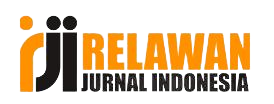Small and Medium Enterprise Development: Concept Overview of Stakeholder Engagement, Business Coaching, and the ADDIE Model in Training
Pengembangan Usaha Kecil dan Menengah: Tinjauan Konsep Keterlibatan Stakeholder, Businese Coaching, dan Model ADDIE dalam Pelatihan
DOI:
https://doi.org/10.21070/jkmp.v10i2.1690Keywords:
Small and Medium Enterprises, stakeholders, business coaching, ADDIE system trainingAbstract
There are various problems faced by Small and Medium Enterprises (SMEs), especially those related to business competition, technological developments, and transformation into the digital era. These various problems require the strategic role of the government and other stakeholders to be present to provide solutions. The ability of SME entrepreneurs can be developed through various forms of intervention, both in the form of mentoring and training. This study is intended to describe the concept of stakeholder involvement, assistance in the form of business coaching, and training programs using the ADDIE system model. There needs to be empirical research on government institutions that function to foster and develop SMEs in various forms, for example through business incubators or other formats
References
Adi, K., Riptanti, E.W., & Irianto, H. (2017). Growing a Technopreneurship-Based New Entrepreneur in Business Incubator. Asian Journal of Innovation and Entrepreneurship, 2(2), 122-139.
Akhmad, K.A., Karsidi, R., Rahayu, E.S., &Wijaya, M. (2018). The Role of Government Policy in SMEs Facilitating Institutions in Indonesia: A Case Study on Business Development Services Provider. Asian Journal for Poverty Studies, 4(1), 12-15. https://doi.org/10.33369/ajps.v4i1.4897.
Aladejebi, O.A. (2018). Predictors of firm performance among selected SMEs in Lagos, Nigeria. International Journal of Applied Research, 4(6), 8-17.
Allen, W.C. (2006). Overview and Evolution of the ADDIE Training System. Advances in Developing Human Resources,8(4),430-441. https://doi.org/10.1177/1523422306292942.
Al-Mubaraki, H. & Aruna, M. (2013). Technology Innovation for SME Growth: A Perception for the Emerging Economies. Journal of Economics and Sustainable Development, 4(3), 156-162.
Alsos, G.A., Hytti, U. & Ljunggren, E. (2011). Stakeholder Theory Approach to Technology Incubators. International Journal of Entrepreneurial Behaviour & Research,17(6),607-625. https://doi.org/10.1108/13552551111174693.
Andriani, M., Samadhi, T.M.A.A., Siswanto, J., & Suryadi, K. (2018). Aligning Business Process Maturity Level With SMES Growth In Indonesian Fashion Industry. International Journal of Organizational Analysis, 26 (4), 709-727. https://doi.org/10.1108/IJOA-08-2017-1215
Anton, S.A., Muzakan, I., Muhammad, W.F., Syamsudin, & Sidiq, N.P. (2015). An Assessment of SME Competitiveness in Indonesia. Journal of Competitiveness,7(2),60-74. https://doi.org/10.7441/joc.2015.02.04
Baporikar, N. &Deshpande, M. (2017). SMEs and Branding Strategies. International Journal of Applied Management Sciences and Engineering, 4(1), 43-55. https://doi.org/10.4018/IJAMSE.2017010104
Bismala, L., Andriany, D., & Siregar, G. (2019). Development Strategy Analysis of Technology Business Incubator inSmall Medium Enterprises Accompaniment. Journal of Critical Reviews, 7(1), 221-225. http://dx.doi.org/10.31838/jcr.07.01.39
Bougrain, F. & Haudeville, B. (2002). Innovation, Collaboration and SMEs Internal Research Capacities. Research Policy,31,735–747.
Brien,E.O.& Hamburg,I. (2014). Supporting Sustainable Strategies for SMEs through Training, Cooperation and Mentoring. Higher Education Studies, 4 (2), 61-69. http://dx.doi.org/10.5539/hes.v4n2p61
Chadee, D., Wiesner, R., & Banjo Roxas, H. (2011). Environmental Sustainability Change Management in SMEs: Learning from Sustainability Champions. International Journal of Learning and Change, 5, (3-4), 194-207. https://doi.org/10.1504/IJLC.2011.045068
Christina, B., Neelufer, A. & Al-Amri, S. (2014). Challenges and Barriers Encountered by the SMES Owners in Muscat. International Journal of Small Business and Entrepreneurship Research, 2(3), 1-13.
Crompton, B.M. (2012). The Effect of Business Coaching and Mentoring on Small-to-Medium Enterprise Performance and Growth. A Thesis Submitted in Fulfillment of The Requirements for the Degree of Doctor of Philosophy. School of Management College of Business RMIT University, Melbourne, Australia.
Cui, A.P., Walsh, M.F., & Gallion, D. (2011). International Journal of Business and Social Research (IJBSR), 1(1), 57-69.
Desmaryani, S. (2016). The Role of Regional Government in Growing Small and Medium Enterprises’ Performance towards Creative Industry in Jambi Province. Jurnal Bina Praja, 9(1), 159-169. https://doi.org/10.21787/jbp.09.2017.159-169
Dobbs, R.L. (2006). Development Phase of Systematic Training: New Technology Lends Assistance. Advances in Developing Human Resources, 8(4), 500-513. https://doi.org/10.1177/1523422306293001.
Elmansor, E. & Arthur, L. (2015). Entrepreneurship and SMEs through Business Incubators in the ArabWorld: Case Study of Jordan. Journal of Business and Economics,6(10),1791-1800. https://doi.org/10.15341/jbe(2155-7950)/10.06.2015/014
Eniola, A.A. & Entebang, H. (2015). Government Policy and Performance of Small and Medium Business Management. International Journal of Academic Research in Business and Social Sciences, 5(2), 237-248.http://dx.doi.org/10.6007/IJARBSS/v5-i2/1481.
Eze, U.C., Goh, G.G.G., Goh, C.Y., &Tan, T.L. (2013). Perspectives of SMEs on Knowledge Sharing. The Journal of Information and Knowledge Management Systems, 43 (2), 210-236. https://doi.org/10.1108/03055721311329963.
Febriani, E., &Dewobroto, W.S. (2018). Problems And Requirement Analysis as a First Step to Connect Researchers and Small and Medium Enterprises (SMEs). Cogent Business and Management, 5(1). https://doi.org/10.1080/23311975.2018.1513774.
Foghani, S., Mahadi, B., & Omar, R. (2017). Promoting Clusters and Networks for Small and Medium Enterprises to Economic Development in the Globalization Era. SAGE Open, 1-9. https://doi.org/10.1177/2158244017697152.
Gozali, L., Masrom, M., Haroon, H.N., & Zagloel, T.Y.M. (2015). A Framework of Successful E-Business Incubator for Indonesian Public Universities. The Asian Journal of Technology Management, 8(2),118-131. http://dx.doi.org/10.12695/ajtm.2015.8.2.4
Gray, D.E., Ekinci, Y., &Goregaokara, H. (2011). Coaching SME Managers: Business Development or Personal Therapy?: A Mixed Methods Study. The International Journal of Human Resource Management, 22(4), 863–882. https://doi.org/10.1080/09585192.2011.555129
Hakonsson, D.D., Burton, R.M., Obel, B., & Lauridsen, J.T. (2012). Strategy Implementation Requires the Right ExecutiveStyle: Evidence from Danish SMEs. Long Range Planning, 45, 182-208. https://doi.org/10.1016/j.lrp.2012.02.004 http://www.elsevier.com/locate/lrp
Hana, U. (2013). Competitive Advantage Achievement through Innovation and Knowledge. Journal of Competitivenes,5(1),82-96. https://doi.org/10.7441/joc.2013.01.06
Hansen, J.W. (2006). Training Design: Scenarios of the Future. Advances in Developing Human Resources, 8(4),492-499. https://doi.org/10.1177/1523422306292999
Hassan, N.A. (2020). University Business Incubators as a Tool for Accelerating Entrepreneurship: Theoretical Perspective. Review of Economics and Political Science, The current issue and full text archive of this journal is available on Emerald Insight at: https://www.emerald.com/insight/2631-3561. https://doi.org/10.1108/REPS-10-2019-0142
Hausberg, J.P. & Korreck, S. (2020). Business Incubators and Accelerators: A Co-Citation Analysis-Based, Systematic Literature Review. Journal of Technology Transfer, 45,151–176. https://doi.org/10.1007/s10961-018-9651-y
Hernández, R. &Carràa, G. (2016). A Conceptual Approach for Business Incubator Interdependencies and Sustainble Development. Agriculture and Agricultural Science Procedia, 8, 718 – 724. https://doi.org/10.1016/j.aaspro.2016.02.054
Hutabarat, Z. & Pandin, M. (2014). Absorptive Capacity of Business Incubator for SME’s Rural Coomunity Located in Indonesia’s Village. Procedia - Social & Behavioral Sciences, 115, 373 – 377. https://doi.org/10.1016/j.sbspro.2014.02.443
Ibrahim, S. &Heng, L.H.(2015). The Roles of Learning in Stimulating Knowledge Sharing at SMEs. Global Conference on Business & Social Science-2014, GCBSS-2014, 15th & 16 th December, Kuala Lumpur. Procedia - Social and Behavioral Sciences, 172,230-237. https://doi.org/10.1016/j.sbspro.2015.01.359
Imran, M., Salisu, I., Aslam, H.D., & Iqbal, J. (2019). Resource and Information Access for SMESustainability in the Era of IR 4.0: The Mediating and Moderating Roles of Innovation Capability and Management Commitment. Journal Processes, 7, 211.https://doi.org/10.3390/pr7040211www.mdpi.com/journal/processes
Irjayantia, M. & Azis, A.M. (2012). Barrier Factors and Potential Solutions for Indonesian SMEs. International Conference on Small and Medium Enterprises Development with a Theme “Innovation and Sustainability in SME Development” (ICSMED 2012). Procedia Economics and Finance, 4, 3-12. https://doi.org/10.1016/S2212-5671(12)00315-2
Jurado, T.& Battisti, M. (2019). The Evolution of SME Policy: the Case of New Zealand, Regional Studies, Regional Science, 6 (1), 32-54. https://doi.org/10.1080/21681376.2018.1562368
Kanibir, H., Saydan, R., & Nart, S.(2014). Determining the Antecedents of Marketing Competencies of SMEs for International Market Performance. 10th International Strategic Management Conference. Procedia - Social and Behavioral Sciences, 150,12-23. https://doi.org/10.1016/j.sbspro.2014.09.003
Kenny, B. & Fahy, J. (2011). Network Resources and International Performance of High Tech SMEs. Journal of Small Business and Enterprise Development,18(3),529-555. https://doi.org/10.1108/14626001111155691
Klewitz, J., Zeyen, A.,& Hansen, E.G. (2012), Intermediaries Driving Eco‐Innovation in SMES: A Qualitative Investigation. European Journal of Innovation Management, 15(4), 442-467. https://doi.org/10.1108/14601061211272376
Koh, E.T., &Owen, W.L. (2000). Descriptive Research and Qualitative Research. Introduction to Nutrition and Health Research. Springer, Boston, MA, pp.219-248. https://doi.org/10.1007/978-1-4615-1401-5_12
Korte, R.F. (2006). Training Implementation: Variations Affecting Delivery. Advances in Developing Human Resources,8(4),514-527. https://doi.org/10.1177/1523422306293005
Kunaka, C., &Moos, M.N. (2019). Evaluating Mentoring Outcomes from the Perspective of Entrepreneurs and Small Business Owners. The Southern African Journal of Entrepreneurship and Small Business Management, 11(1), 1-11. https://doi.org/10.4102/sajesbm.v11i1.214
Lakatos, E.S., Dan, C., & Anca, M.M. (2011). Trends in Building Partnerships Between SMEs and NGOs For Sustainable Enterprises in Romania. Conference: Proceedings of the 2nd Review of Management and Economic Engineering Management Conference. At: Cluj-Napoca, Romania
Li, C., Ahmed, N., Qalati, S.A., Khan, A., & Naz, S. (2020). Role of Business Incubators as a Tool for Entrepreneurship Development: The Mediating and Moderating Role of Business Start-Up and Government Regulations. Sustainability, 12, 1-23. https://doi.org/10.3390/su12051822 www.mdpi.com/journal/sustainability
Lin, F., Ansell, J., Marshall, A., & Ojiako, U. (2019). Managing and Building B2BSME Brands: An Amerging Market Perspective. PSU Research Review, 3(3), 191-214. https://doi.org/10.1108/PRR-04-2019-0010
Maldonado-Erazo, C.P., Álvarez-García, J., del Río-Rama, M.C., & Correa-Quezada, R. (2020). Corporate Social Responsibility and Performance inSMEs: Scientific Coverage. Sustainability,12, 2332.https://doi.org/10.3390/su12062332 www.mdpi.com/journal/sustainability
Manan, S.K.A., Othman, J., & Shahadan, A. (2011). Descriptive Analysis on the Pattern of SME Financing in Malaysia. 3 rd International Symposium & Exhibition in Sustainable Energy & Environment, 1-3 June 2011, Melaka, Malaysia, pp. 139-147.
Manzaneque-Lizano, M., Alfaro-Cortés, E., & de la Cruz, A.M.P. (2019). Stakeholders and Long-Term Sustainability of SMEs.Who Really Matters in Crisis Contexts, and When. Sustainability, Vol. 11, No. 6551. https://doi.org/10.3390/su11236551www.mdpi.com/journal/sustainability
Masa'deh, R. & Obeidat, B.Y. (2014). The Implementation Process of Training Programs in Jordan: The Role of Information Systems. European Journal of Scientific Research, 10 (1).
Mayfield, M. (2011). Creating training and development programs: using the ADDIE method. Development and Learning in Organizations, 25(3), 19-22. https://doi.org/10.1108/14777281111125363
Milzam, M., Mahardika, A., & Amalia, R. (2020). Corona Virus Pandemic Impact on Sales Revenue of Micro Small and Medium Enterprises (MSMEs) in Pekalongan City. Journal of Vocational Studies on Applied Research ,2(1),7-10. https://doi.org./10.14710/jvsar.2.1.2020.7-10
Moldovan, L. (2016). Training Outcome Evaluation Model. Procedia Technology, 22, 1184 – 1190. https://doi.org/10.1016/j.protcy.2016.01.166
Mourougane, A. (2012). Promoting SME development in Indonesia, OECD Economics Department Working Papers, No. 995. OECD Publishing. https://doi.org/10.1787/5k918xk464f7-en.
Mughan, T., Lloyd-Reason, L.,& Zimmerman, C. (2004). Management Consulting and International Business Support for SMEs: Need And Obstacles. Education and Training, 46(8/9), 424-432. https://doi.org/10.1108/00400910410569542
Najib, M., Kiminami, A., & Yagi, H. (2011).Competitiveness of Indonesian Small and Medium Food ProcessingIndustry: Does the Location Matter?. International Journal of Business and Management, 6(9), 57- 67. https://doi.org/10.5539/ijbm.v6n9p57www.ccsenet.org/ijbm
Nassaji, H. (2015). Qualitative and Descriptive Research: Data Type versus Data Analysis. Language Teaching Research, 19(2), 129-132. https://doi.org./10.1177/1362168815572747
Nohong, M., Sanusi, A., Nurqamar, I.F., & Harun, S. (2018). Strategic Model in Increasing the SMEs Competitive Advantage in South Sulawesi. International Journal of Administrative Science & Organization, 25(2), 57-65
Odoom, R.& Narteh, B. (2017). Branding in Small and Medium-Sized Enterprises (SMEs): Current Issues and Research Avenues. Qualitative Market Research: An International Journal, 20(1), 68-89. https://10.1108/QMR-12-2015-0091
OECD. (2004). Promoting Entrepreneurship and Innovative SMEs in a Global Economy: Towards A More Responsible and Inclusive Globalisation. 2nd OECD Conference Of Ministers Responsible For Small And Medium-Sized Enterprises (SMEs). Istanbul, Turkey, 3-5 June 2004.
OECD. (2010). Business Climate Development StrategySME: Policy and Promotion. Report is issued under the authority of the Steering Groups ofthe MENA-OECD Initiative. MENA-OECD Investment Programme.
Ombi, N., Ambad, S. N. A., & Bujang, I. (2018). The Effect of Business Development Serviceson Small Medium Enterprises (SMEs) Performance. International Journal of Academic Research in Business and Social Sciences, 8(3), 117–130.http://dx.doi.org/10.6007/IJARBSS/v8-i3/3910
Oniszczuk-Jastrząbek, A., Dêbicka, O., &Czuba, T. (2018). Innovation as a Determinant of SMEs Competitiveness in Poland. International Business & Global Economy, No. 37, pp. 421–435. https://doi.org/10.4467/23539496IB.18.031.9404
Oparaocha, G.O. (2015). SMEs and International Entrepreneurship: An Institutional Network Perspective. International Business Review. 24(5), 861-873. https://doi.org/10.1016/j.ibusrev.2015.03.007
Peel, D. (2004). Coaching and Mentoring in Small to Medium SizedEnterprises in the UK: Factors that Affect Success and a Possible Solution. International Journal of Evidence Based Coaching and Mentoring, 2(1), 46-56.
Peel, D. (2008). What Factors Affect Coaching and Mentoring in Small and MediumSized Enterprises. International Journal of Evidence Based Coaching and Mentoring, 6(2), 1-18.
Pelletier, C. &Cloutier, L.M. (2019). Challenges of Digital Transformation in SMEs: Exploration of IT-Related Perceptions in a Service Ecosystem. Proceedings of the 52 nd Hawaii International Conference on System Sciences. (HICSS). At: Maui, Hawaii, USA. https://doi.org/10.24251/HICSS.2019.597
Peters, B.G. (2018) The Challenge of Policy Coordination. Policy Design and Practice, Vol.1, No.1, pp.1-11.https://doi.org/10.1080/25741292.2018.1437946
Piperopoulos, P. (2010). Qualitative Research in SMEs and Entrepreneurship: ALiterature Review of Case Study Research. International Journal of Economics and Business Research, 2(6), 494-510. http://dx.doi.org/10.1504/IJEBR.2010.035701
Prasanna,RPIR, Jayasundara, JMSB., Gamage, S.K.N., Ekanayake, E.M.S., Rajapakshe, P.SK.& Abeyrathne, G.A.K.N.J. (2019). Sustainability of SMEs in the Competition: A Systemic Review on Technological Challenges and SME Performance. Journal of Open Innovation & Technology, Market & Complexity, 5(100), 1-18. https://doi.org/10.3390/joitmc5040100 www.mdpi.com/journal/joitmc
Raymond, L. &Bergeron, F. (2008). Enabling the Business Strategy of SMEs through E‐Business Capabilities. Industrial Management & Data Systems,Vol. 108, No. 5, pp.577-595. https://doi.org/10.1108/02635570810876723
Rekarti, E. & Doktoralina, C.M. (2017). Improving Business Performance: A Proposed Model for SMEs. European Research Studies Journal, 20(3A), 613-623.
Revindo, M.D., & Gan, C. (2016). Export Stimuli, Export Stages and Internationalization Pathways: TheCase of Indonesian SMEs. Economics and Finance in Indonesia, 62(3), 191–205.
Roberts, P.B. (2006). Analysis: The Defining Phase ofSystematic Training Advances in Developing Human Resources, 8(4), 476-491. https://doi.org/10.1177/1523422306293014
Robertson, J.A. (2017). Boosting Ghanaian SME Performance: The Role of Corporate Social Responsibility in Ghanaian SMEs. Annals in Social Responsibility,3(1),72-74. https://doi.org/10.1108/ASR-10-2017-0012
Rothkegel, S., Ljiljana, E., & Deborah, S. (2006). StrategicAlliances Between SMEs and Large Firms: An Exploration of the Dynamic Process.Management Revue, ISSN 1861-9916, Rainer Hampp Verlag, Mering, 17(1), 50-71. This Version is available at:http://hdl.handle.net/10419/78877
Salas, E., Tannenbaum, S.I., Kraiger, K., &Smith-Jentsch, K.A. (2012). The Science of Training and Developmentin Organizations: What Matters in Practice. Psychological Science in the Public Interest,13(2),74-101. https://doi.org/10.1177/1529100612436661
Scupola, A. (2003). Government Intervention in SMEs E-CommerceAdoption: An Institutional Approach. 7th Pacific Asia Conference on Information Systems, 10-13 July, Adelaide, South Australia, pp.184-195.
Seixas, B.V., Smith, N., & Mitton, C.(2018). The Qualitative Descriptive Approach in International Comparative Studies: Using Online Qualitative Surveys. International Journal of Health Policy and Management,7(9),778–781. https://doi.org/10.15171/IJHPM.2017.142
Singh, R.K., Garg, S.K., &Deshmukh, S.G.. (2010). The competitiveness of SMEs in a Globalized Economy: Observations from China and India. Management Research Review, 33(1), 54-65. https://doi.org/10.1108/01409171011011562
Smith, M.H. &Smith, D. (2007). Implementing Strategically Aligned Performance Measurement in Small Firms. International Journal of Production Economics,106,393–408. https://doi.org/10.1016/j.ijpe.2006.07.011
Stevenson, C.E., Kleibeuker, S.W., De Dreu, C.K.W, &Crone, E.A. (2014). Training Creative Cognition: Adolescence as a Flexible Period for Improving Creativity. Frontiers in Human Neuroscience,8(8), 827. https://doi.org/10.3389/fnhum.2014.00827
Suárez, C.A. (2016). Best Management Practices: SMEs’ Organizational Performance ManagementBased On Internal Controls in Mexico. Journal of International Business and Economics, 4(2), 41-58. https://doi.org/10.15640/jibe.v4n2a5
Tjahjadi, A.M., Purwandari, C.A., & Massie, N.W.G. (2019). Recent Development of Small Medium Enterprises’ Businesses Profitability: Evidence from Indonesia. Conference: the 2nd International Conference on Inclusive Business in the Changing World:Jakarta.https://doi.org/10.5220/0008429001830189
Tobing, D.S.K., Fathorazzi, M., & Wulandari, G.A.(2018). Mapping the Competitive Advantage of SMEs in East Java, Indonesia. Jurnal Dinamika Manajemen,9(1),23-32. https://doi.org/10.15294/jdm.v9i1.14649
Tonis, R.B.M. (2015). SMEs Role in Achieving Sustainable Development. Journal of Economic Development Environment and People, 4(1), 41-50. https://doi.org/10.26458/jedep.v4i1.102
Tsukanova, T. (2014). Institutional Model of SMEs internationalization. Proceedings from Conference of International Council for Small Business At: Dublin, Ireland.
Utami, R.M.,&Lantu, D.C. (2014). Development Competitiveness Model for SmallMedium Enterprises among the Creative Industry in Bandung. The 5th Indonesia International Conference on Innovation, Entrepreneurship,and Small Business (IICIES 2013). Procedia - Social and Behavioral Sciences, 115,pp 305-323. https://doi.org/10.1016/j.sbspro.2014.02.438
Valdez-Juárez, L. E., García-Pérez de Lema, D., & Maldonado-Guzmán, G. (2016). Management ofKnowledge, Innovation and Performance in SMEs. Interdisciplinary Journal of Information, Knowledge, and Management, 11, 141-176. https://doi.org/10.28945/3455 Retrieved from http://www.informingscience.org/Publications/3455
Vanags, A., Ābeltiņa, A. & Zvirgzdiņa, R. (2018). Partnership Strategy Model for Small and Medium Enterprises. Problems and Perspectives in Management,16(1),336-347 https://doi.org/10.21511/ppm.16(1).2018.33
van deVrande, V., Jong, J.P.J. de, Vanhaverbeke, W., & de Rochemont, M. (2009). Open innovation in SMEs: Trends, motives and management challenges. Technovation, Vol. 29, 423–437. https://doi.org/10.1016/j.technovation.2008.10.001
Vavoula, G.N.& Sharples, M. (2007). Future Technology Workshop: A Collaborative Method for the Design of New Learning Technologies and Activities. International Journal of Computer Supported Collaborative Learning, 2(4), https://doi.org/10.1007/s11412-007-9026-0
Walker, B., Redmond, J., Sheridan, L., Wang, C., &Goeft, U. (2008). Small and Medium Enterprises and theEnvironment: Barriers, Drivers, Innovation And Best Practice: A Review Of The Literature. Perth, Australia: Edith Cowan University. This Report is posted at Research Online. https://ro.ecu.edu.au/ecuworks/7062/
Wang, G.G.& Wilcox, D. (2006). Training Evaluation: Knowing More Than Is Practiced. Advances in Developing Human Resources, 8(4), 528-539. https://doi.org/10.1177/1523422306293007
Wang, Y. (2016). What are the Biggest Obstacles to Growth of SMEs in Developing Countries? - An Empirical Evidence from an Enterprise Survey. Borsa Istanbul Review, 16(3), 167-176. https://doi.org/10.1016/j.bir.2016.06.001
Westman, L., Luederitz, C., Kundurpi, A., Mercado, A.J., Weber, O., & Burch, S.L.(2019). Conceptualizing Businesses as Social Actors: A Framework forUnderstanding Sustainability Actions in Small‐ And Medium‐Sized Enterprises. Business Strategy and the Environment, 28, 388–402.https://doi.org/10.1002/bse.2256wileyonlinelibrary.com/journal/bse
Woo, W.H. (2018). Applying ADDIE Model to Ideate Precision Medicine in a Polytechnic Biomedical Science Programme. Journal of Biomedical Education, 2018, Article ID 4268517, pp.1-5.https://doi.org/10.1155/2018/4268517
World Bank. (2018). Improving Access to Finance for SMES: Opportunities through Credit Reporting, Secured Lending and Insolvency Practices. https://www.doingbusiness.org/content/dam/doingBusiness/media/Special-Reports/improving-access-to-finance-for-SMEs.pdf Accessed August 8, 2020
Yohandi, D.H., Parjanto, & Rahayu, F.S. (2018). Redesigning Mobile Human-Resource Management in Small and Medium Enterprises. Journal of Information System Engineering and Business Intelligence, 4(2), 116-124. Available online at: http://e-journal.unair.ac.id/index.php/JISEBI
Yoshino, N. & Taghizadeh-Hesary, F. (2016). Major Challenges Facing Small and Medium-sized Enterprisesin Asia and Solutions for Mitigating Them.ADBI Working Paper Series, No. 564. Tokyo: Asian Development Bank Institute. https://doi.org/10.2139/ssrn.2766242
Yusoff, T., Wahab, S.A., Latiff, A.S.A., Osman, S.I.W., Zawawi, N.F.M., & Fazal, S.A. (2018). Sustainable Growth in SMEs: A Review from the Malaysian Perspective. Journal of Management and Sustainability, 8 (3), 43-54. https://doi.org/10.5539/jms.v8n3p43
Zain, M. & Kassim, N.M. (2013). Management of Change in SMEs in Times of Turbulence. International Journal of Humanities and Social Science, 3(11), 110-118
















